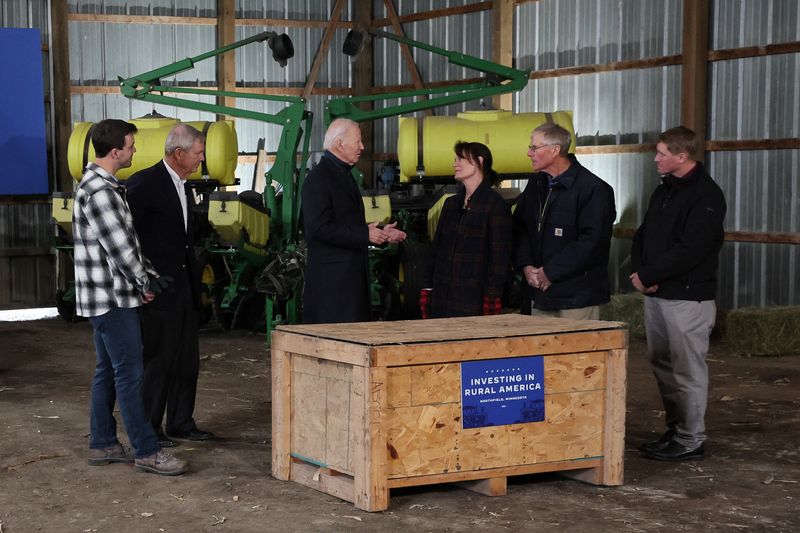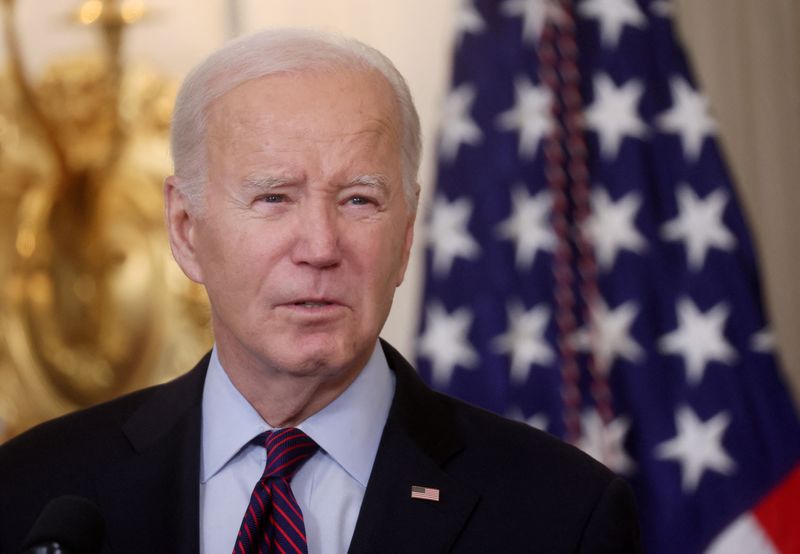By Andrea Shalal
NORTHFIELD, Minnesota (Reuters) - U.S. President Joe Biden on Wednesday said consolidation in meat processing and retail chains over the decades has hurt U.S. farmers and announced $5 billion in new investments benefiting rural Americans during a visit to a family farm in Minnesota.
The trip, the first stop in what the White House is billing as a two-week "barnstorming" tour, will also see 13 top administration officials visit rural places in 15 states, including election battlegrounds like Michigan, Pennsylvania and Arizona. They will highlight investments in rural communities, where one in five Americans live.
"When rural America does well, when Indian country does well, we all do well," Biden said during a visit to Dutch Creek Farms, a hog, soybean and corn farm now being run by a third generation of the Kluver family.
Biden said just four big companies control "more than half the market in beef, pork and poultry," and when one of these companies shut, it causes large supply chain disruptions and hurts farmers.
"Because of these investments we're making, family farms are going to stay in the family," Biden said, highlighting his efforts to improve market competition and invest in internet and rural electrification.
The Minnesota event also allowed top Democratic officials from the state to show their support for Biden just days after Minnesota lawmaker Dean Phillips launched a primary challenge to a sitting president, sources familiar with the plans said.
Biden will participate in a fundraiser in Minneapolis after the farm visit.
A Biden campaign official noted that Democrats improved their margins in rural areas in 2022 compared to 2020, winning over former supporters of former President Donald Trump.
"We are treating these 2022 newly Democratic voters as key persuasion targets for 2024 and are not taking any vote (rural/suburban/urban) for granted," the official added.
White House spokesperson Karine Jean-Pierre did not link the president's visit to Phillips' long-shot challenge, but said the administration was "thankful" to Phillips for voting nearly 100% with Biden over the past two years.
"Minnesota is an important state that the president wanted to go and visit," she said, adding that Biden planned to speak directly with rural Americans about how his legislation is creating jobs in their communities and other urgently needed investments.
Biden beat former president Donald Trump in Minnesota by 52.4% to 45.3%, winning the state's 10 electoral college votes.
The Democratic president arrived in Minnesota amid mounting criticism by Muslim and Arab Americans over his support for Israel's bombardment of the Gaza Strip.
Jaylani Hussein, executive director of the Council of American Islamic Relations (CAIR) for Minnesota, said Arab and Muslim American leaders and their allies planned protests of Biden's Israel policy at the Minneapolis-St Paul International Airport, at the farm he is visiting, and in downtown Minneapolis.
White House officials had no immediate comment on the protests.
Reuters reported in September that the White House and Biden's campaign planned an aggressive outreach to rural voters, who account for 30% of the electorate in highly contested North Carolina, Georgia and Wisconsin, and around 22% in Pennsylvania.
Biden's campaign is actively targeting Black farmers with a new television ad that will run in Raleigh, North Carolina and on national cable news, the third campaign ad targeting Black Americans.
It's part of a 16-week, $25 million advertising campaign targeting key voters in battleground states, that are hotly contested because their voting preferences can swing either to Republicans or Democrats.
Getting credit for economic gains is crucial to Biden's 2024 reelection, but many rural voters feel frustrated and disengaged after decades of industrial decline and job losses in the face of globalization and declining agriculture.

The more than $5 billion in new investments for rural America Biden announced on Wednesday will be drawn from the Inflation Reduction Act, a $1 trillion bipartisan infrastructure law and reprogramming of existing funds.
The money includes $1.7 billion to support climate-smart agriculture practices, $1.1 billion for clean water and other infrastructure, and $2 billion for economic development projects in nine states and Puerto Rico, along with additional investments for expanding broadband access.
